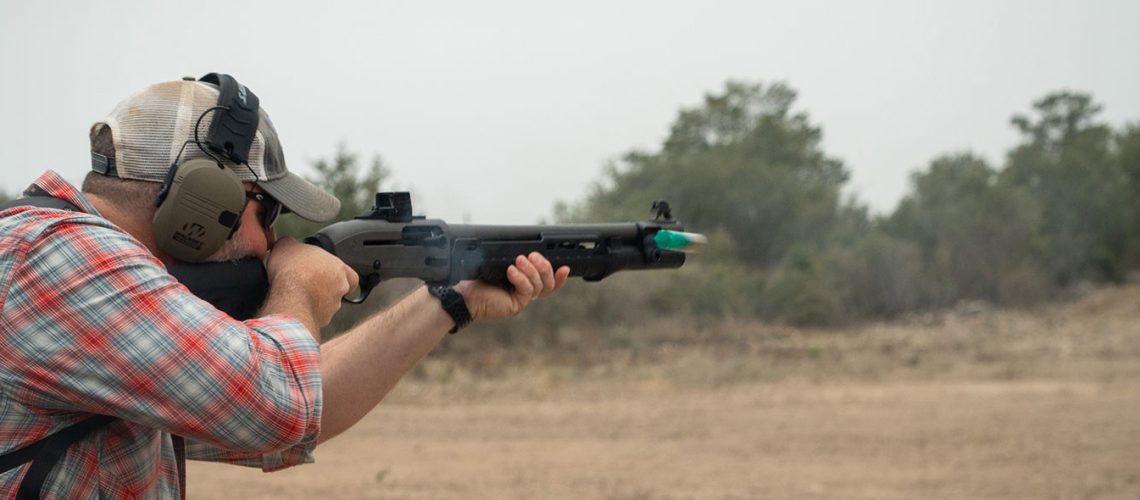The advantages of a shotgun for defensive purposes, particularly in a home or at close quarters, can sometimes get lost in the rush to choose an everyday carry firearm.
However, it’s worth considering a shotgun and the benefits it can provide in certain situations. And, weighing the options available to see if it’s right for you.
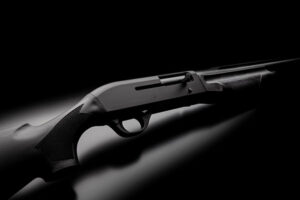 PUMP VS. SEMI-AUTO
PUMP VS. SEMI-AUTO
Pump action shotguns have a reputation as being more reliable than semi-auto shotguns because, for a long period of time, they were.
However, these days, the notion of a semi-auto being UN-reliable doesn’t reflect the advancements and improved performance of the semi-auto or inertia guns.
Nevertheless, clearing a jammed shell with a pump action shotgun is likely quicker and easier than with a semi-auto. That’s a big deal, when a less skilled shooter can “short stroke” a pump action, resulting in a shell that’s not fully pushed forward.
Because gas pressure or inertia from the shot is used to load the next round, semi-auto shotguns deliver less recoil than a pump action, which means quicker return to target, and more time for follow up shots.
CAPACITY
One drawback of the typical shotgun is ammo supply—and reload. That’s why it would make sense to get a magazine tube extension for your defensive home shotgun. Almost every shotgun around offers these extensions, and they’re a relatively simple install. When it comes to ammo, better to have it and not need it than to need it and not have it.
BARREL LENGTH
In close quarters, you’ll need a shorter barrel. A 26- or 30-inch barrel will be unwieldy in a home defense situation around corners or down halls and stairways. You could buy a shorter barrel for your sports shotgun, or you could just get a tactical shotgun already manufactured for that purpose.
 12-GAUGE VS. 20-GAUGE
12-GAUGE VS. 20-GAUGE
The world of shotguns is dominated by the 12-gauge shell. it might be worth considering a 20-gauge for home defense. The more recoil and the heavier weight of the 12-gauge might make it worth considering the 20-gauge, particularly for smaller-framed shooters. And, the amount of shot delivered is not considerable enough to exclude the 20-gauge.
RELIABILITY
The shotgun is a notoriously reliable weapon to fire. Any issues with reliability come from the pump action. Improper operation can jam or fail to clear a shell. And, clearing it can take time you don’t have in a defensive situation.
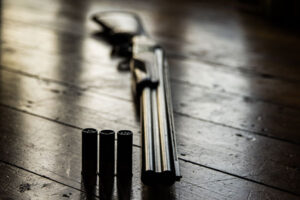 CHOKE TYPE
CHOKE TYPE
In a close-quarters engagement, cylinder bore or improved cylinder are the recommended chokes. Many short barrels assume this and are cylinder bore without the interchangeable choke systems you would find on sporting shotguns. Relying on “spread” to hit your target is a myth. You absolutely still have to aim. Perhaps not as precisely, but a buckshot pattern is still inches—not feet—at home defense distances.
SIGHTS/OPTICS
Naturally, a shotgun requires less precision when hitting the target than a pistol. But that doesn’t absolve the user of proper aim or the benefits of hitting the target in as true a fashion as possible. Iron sights can work for either a sport or tactical shotgun. Optics could come in particularly handy if they allow targeting in darkness. Even to the point of improving vision while seeking out your target in a dimly lit defensive situation.
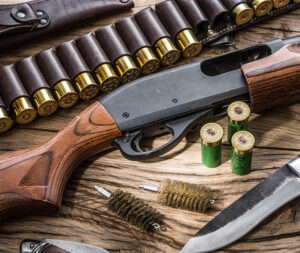 AMMO CARDS & OTHER ACCESSORIES
AMMO CARDS & OTHER ACCESSORIES
Ammo cards are a portable, mobile way to hold multiple shells, and can be useful for reloading your shotgun if you’ve spent all your shells. Also, many have Velcro backing that allows you to choose where you want to carry and access your shells. This is opposed to the “sidesaddle” fixed to some shotguns that can block vision or hinder mobility.
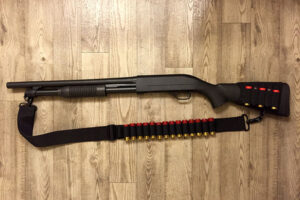 TO SLING OR NOT TO SLING
TO SLING OR NOT TO SLING
A sling for a shotgun can be good for stabilization, but it can also get “hung up” when moving about a home or other close quarters situation. A sling can also make it difficult for an assailant to take your shotgun from you—but remember that when you’re slung, you’re going where the shotgun goes, even in a struggle.
 STORAGE/ACCESSIBILITY
STORAGE/ACCESSIBILITY
Obviously, a shotgun can’t be stored or accessed as easily as a pistol. But that doesn’t mean, with practice, that one can’t be properly stored and accessed very quickly. Like any defensive firearm, the main thing is that you can get to it when you need it. In the case of a shotgun, that may mean moving it for storage at times, depending on your location.
BRANDS/MANUFACTURERS
Your options are vast, whether you’re looking for a sporting shotgun or a tactical shotgun. Mossberg and Remington both make shotguns with tactical variants that are “full sized” as compared to tactical shotguns, as do Stoeger and Benelli. Remington’s 870 Tac-14 and Mossberg’s 590 Shockwave are both solid examples of tactical shotguns, featuring a shorter overall length for maneuverability and ease of carry.
It’s worth considering adding a shotgun to your overall defensive firearm plan. Just the telltale sound of a pump action shotgun racking a round, the firepower and spread pattern at close range, along with reliability, make a defensive shotgun a worthy firearm in many situations.
